Savory scones are some of my favorite quick breads to make. The combination of apricot and rosemary in these scones is so unique. The rosemary is earthy and the apricots a little sweet and tart. I find that they pair really well with your favorite cheeses.
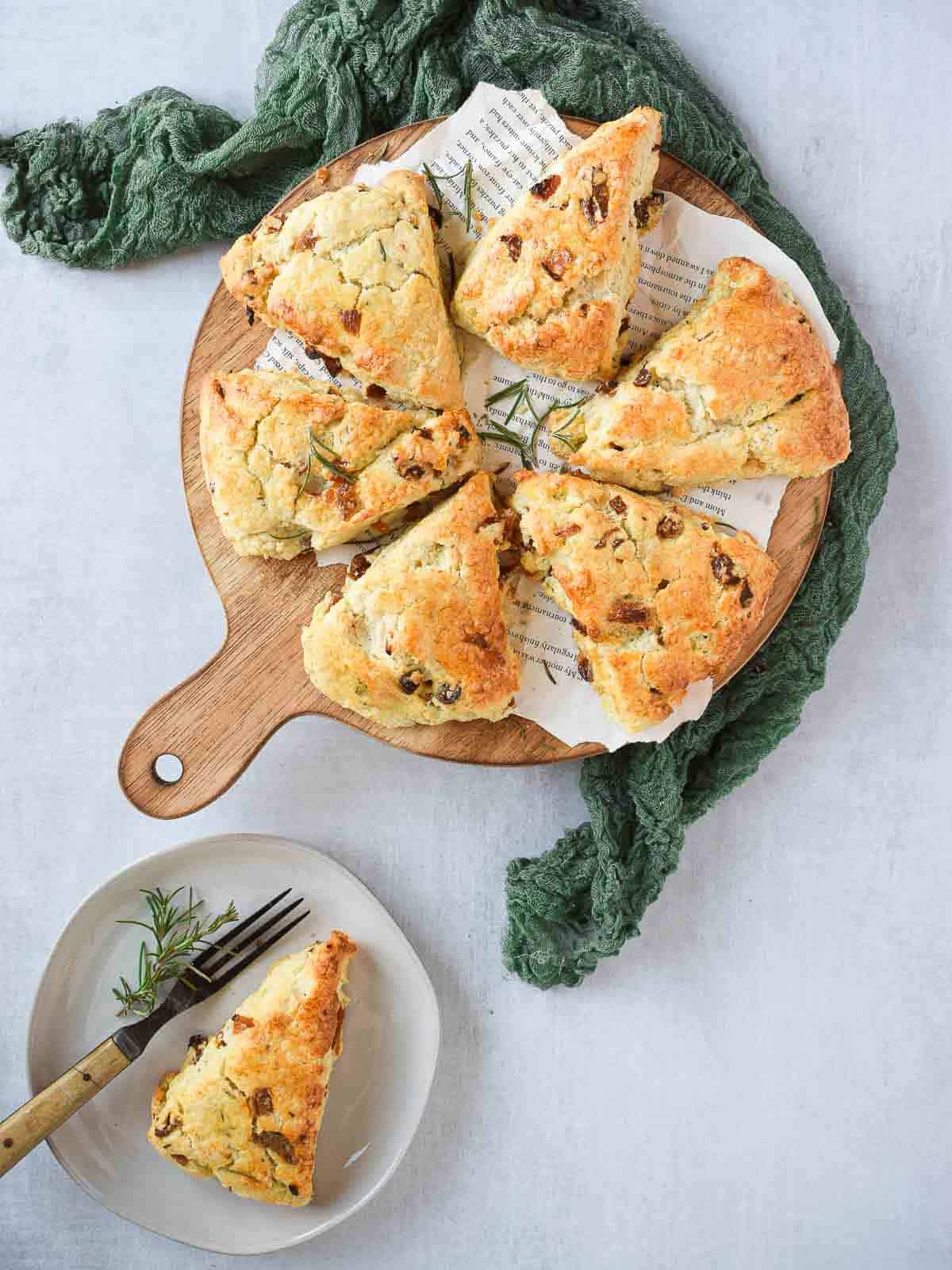
If you have never made scones before, no worries- they really are a breeze to make! Scones can be both sweet like my Cranberry Orange Scones or savory like these Smoked Gouda and Chive Scones. You just want to make sure your butter is cold when you mix it in. The shape is forgiving, so no fancy rolling. I cut mine into even triangles because it's so much easier to serve, and they are just so darn cute that way. These scones are delicious slathered with butter or try serving them alongside your next cheese board instead of crackers.
What you will need for these apricot and rosemary scones:
- Flour: I paired both all purpose (AP) flour and cake flour here. The cake flour makes these a bit more delicate, and the AP flour adds some structure so they still stand up to baking.
- Sugar: White granulated sugar for a hint of sweetness.
- Baking powder: This will help the scones get that nice rise.
- Butter: Cold unsalted butter. Make sure the butter is cold as you will get a more flakier scone this way.
- Egg yolks: These add some structure to the rise.
- Heavy cream: I like to keep my scones traditional with heavy cream.
- Apricots: Dried apricots is the way to go here.
- Rosemary: Fresh rosemary is best, so the flavor really shines. Feel free to lower the amount if you find it too earthy.
- Salt: I like to sprinkle a bit of kosher salt on the top right before baking.
How to store scones:
These scones are best served the day they are made. They will keep for about 1-2 days at room temperature if wrapped aluminum foil or plastic, or placed in an air tight container.
📖Recipe
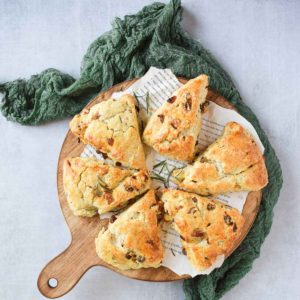
Apricot and Rosemary Scones
Equipment
- 1 baking sheet
- parchment paper
Ingredients
- 1 cup all-purpose flour
- 1 cup plus 2 tbsp cake flour
- 1 tablespoon baking powder
- 2 tablespoon granulated sugar
- ¾ teaspoon Kosher or fine sea salt
- 6 tablespoon unsalted butter, diced into cubes (cold)
- 1½ teaspoon fresh rosemary, chopped
- ¾ cup chopped dried apricots
- 1 cup heavy cream (whipping cream)
- 2 large egg yolks
Egg wash and topping
- 1 large egg
- 1 teaspoon heavy cream or milk
- ⅛ teaspoon Kosher or fine sea salt
Instructions
- Preheat the oven to 400°F. Line a baking sheet with parchment paper.
- In a large bowl, sift together the flour, sugar, baking soda, and salt.1 cup all-purpose flour, 1 cup plus 2 tablespoon cake flour, 1 tablespoon baking powder, 2 tablespoon granulated sugar, ¾ teaspoon Kosher or fine sea salt
- Add the butter pieces to the flour mixture. Using a pastry blender or 2 forks, mix until the butter is the size of peas. Add in the rosemary and apricots and mix to combine.6 tablespoon unsalted butter, diced into cubes (cold), 1½ teaspoon fresh rosemary, chopped, ¾ cup chopped dried apricots
- In another bowl, whisk the egg yolks and heavy cream. Add the cream mixture to the flour mixture and stir to combine. Using your hands, gently gather the dough until all the ingredients are incorporated. Do NOT over-mix. The dough will resemble a moist, crumbly ball. Place the gathered ball onto a floured surface and shape it into a round disc approximately 7 inches in diameter and 1 inch thick.2 large egg yolks, 1 cup heavy cream (whipping cream)
- With a sharp knife, cut the round into 8 equal triangles, then place them onto the baking sheet. Refrigerate for 15 minutes.
- After 15 minutes, remove from the refrigerator. Lightly beat the egg and the heavy cream to make an egg wash. Brush the tops of each scone with the egg wash. Sprinkle the scones with a little salt before baking if you wish.1 large egg, 1 teaspoon heavy cream or milk, ⅛ teaspoon Kosher or fine sea salt
- Bake at 400°F for 18-22 minutes. Let cool on a wire rack for about 15 minutes before serving.
Notes
Nutrition*
*Nutrition information is provided as a courtesy and is an estimate only. Nutrition information can vary depending on many factors, such as products used, measurements and substitutions, therefore it is recommended that you obtain nutritional calculations based on your own finished recipe.


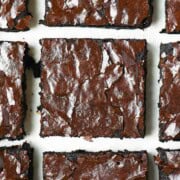

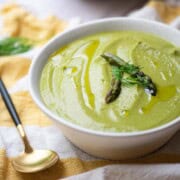

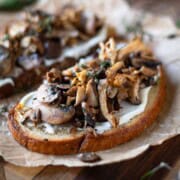
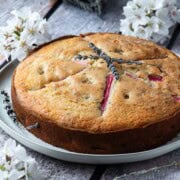
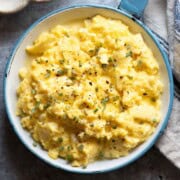




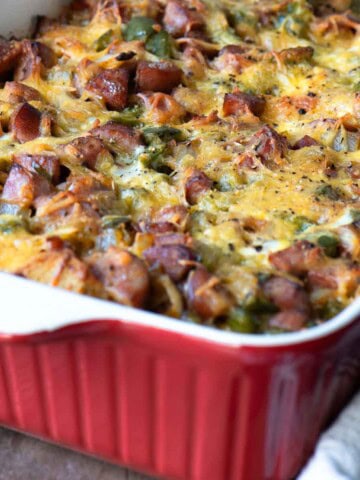

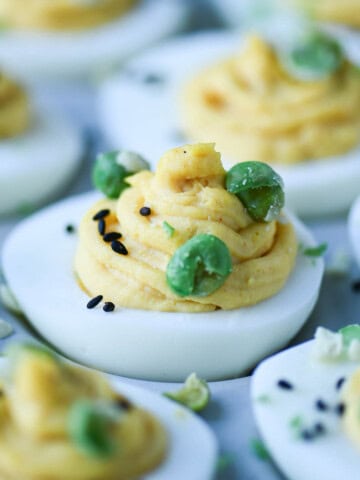

John T says
These are the best